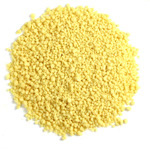
There’s an inexpensive supplement called lecithin in health food stores and supermarkets that might do amazing things for our minds, according to experts.
Lecithin has been shown to improve memory and concentration, and possibly help prevent Alzheimer’s disease.
Nutrition expert Dr. Dharma Singh Khalsa, author of Brain Longevity, says “Lecithin is practically a wonder drug as far as cognitive impairment is concerned.”
Frank Orthoefer, Ph.D., promotes the benefits of lecithin, including improving memory, nerve and brain functioning, in his book Lecithin and Health. Orthoefer has researched lecithin for over 25 years, and is a leading authority on the subject.
So what is lecithin and how might it improve our mind?
What is lecithin and how might it help our brain?
How much lecithin do we need?
Does lecithin have any side effects?
What is lecithin and how might it help our brain?
Lecithin is a naturally occurring substance high in phospholipids – fat-like substances needed to help our brains run smoothly by improving the insulation around nerves. Lecithin is a major part of cell membranes and is vital for proper nerve growth and function.
Egg yolks and organ meats are very good sources of lecithin. Since the cholesterol scare set-in, many of us eat a lot less of these foods than a few decades ago. Some experts think this could be one reason for the increase in the number of people with memory and concentration problems.
David Canty, Ph.D., says there’s a lot of evidence from animal studies that lecithin improves memory and learning. He says human studies suggest lecithin might improve memory. In one study researchers gave 61 healthy older adults, aged 50 to 80 years, either 2 tablespoons of lecithin or a placebo for five weeks. By the end of the study memory test scores of the lecithin group improved significantly, exceeding those of the placebo group. The lecithin group also reported a 48 percent decrease in memory lapses.
The researchers concluded that “the cost of lecithin is so low, the negative side effects so minimal and the potential benefits so positive, that we would recommend … all persons experiencing memory problems … (try) lecithin granules as food supplements.”
Lecithin shows potential for helping treat mental health problems such as Alzheimer’s disease and bipolar disorder (manic depression). This is because lecithin is involved in nerve cell signaling and in creating vital neurotransmitters. Problems with these processes can cause disorders in brain functioning.
How much lecithin do we need?
Some health experts say we get enough lecithin from our diets, so we don’t need to take a lecithin supplement. Others believe that because many people don’t eat enough high-lecithin foods, supplementing the diet with lecithin can benefit us.
Nutritionist Patrick Holford, in his book Optimum Nutrition for the Mind, says adding a tablespoon of lecithin granules or powder to our cereal each day is a cheap and easy way to add more lecithin to our diet. If it’s hiPC lecithin then he says one heaped teaspoon is enough. HiPC lecithin is a type of lecithin high in phosphatidyl choline – a type of phospholipid.
I’ve taken lecithin in the past, both as a powder and granules, for its reported health benefits. I took it daily for months at a time. I’m unsure whether it improved my memory or helped me in other ways, but it tasted mild and pleasant, and was easy to eat. I bought it from the supermarket and it cost about five Australian dollars for 200 grams.
Does lecithin have any side effects?
Most people do not suffer any side effects when taking 10 to 30 grams a day of lecithin supplements, according to Vanderbilt University. Taking higher doses can cause gastrointestinal problems, diarrhea, weight gain, a rash, headaches, nausea, vomiting, dizziness and/or a “fishy” body odor.
Consider taking a lecithin supplement if your diet is low in eggs and organ meats, you want to improve your memory, nerves, mind and concentration, and possibly help prevent Alzheimer’s disease.
written by Nyomi Graef
References:
Canty, D J, 2000, Handbook of Nutraceuticals and Functional Foods, Lecithin and Choline: New Roles for Old Nutrients, CRC Press LLC,
https://docs.google.com/viewer?a=v&q=cache:Lne4oCddQ7sJ:www.crcnetbase.com/doi/abs/10.1201/9781420036695.ch26+David+Canty+lecithin+placebo+memory+2+tablespoons+the+cost+of+lecithin+is+so+low&hl=en&gl=au&pid=bl&srcid=ADGEESgVb7817on8TKBsuRAk0NYB5tyOjR-_2BtUjTrXq6Qyd8ci1MjpNsoXQ50D-uO7wjMx5YNkLMcn9tLNl4HhdU_ocC-JpoTJpO0lWBJA3kga6jrhG-3qX6YywzNMQkxER2LP4m5j&sig=AHIEtbTfiGAPHy8el-LegIZ2R1qT3V4aRw
Holford, P, 2003, Optimum Nutrition for the Mind, London, UK: Piatkus
Lawhon, C, n.d., Lecithin Supplement’s Effectiveness in Weight Loss, Psychology Department, Vanderbilt University,
http://www.vanderbilt.edu/AnS/psychology/health_psychology/LECITHIN_SUPPLEMENT.htm
Orthoefer, F T, 1998, Lecithin and Health, New York, USA: Vital Health Publishing

 May 20th, 2009
May 20th, 2009  Nyomi Graef
Nyomi Graef  Posted in
Posted in  Tags:
Tags: 

Bonjour, Good blog! I greatly like the colors. The one issue that I have is that the RSS feeds arnt viewing right in my viewer.
This is a worthwhile topic and will definitely subscribe.
Just wanted to say you have a great site and thanks for posting!